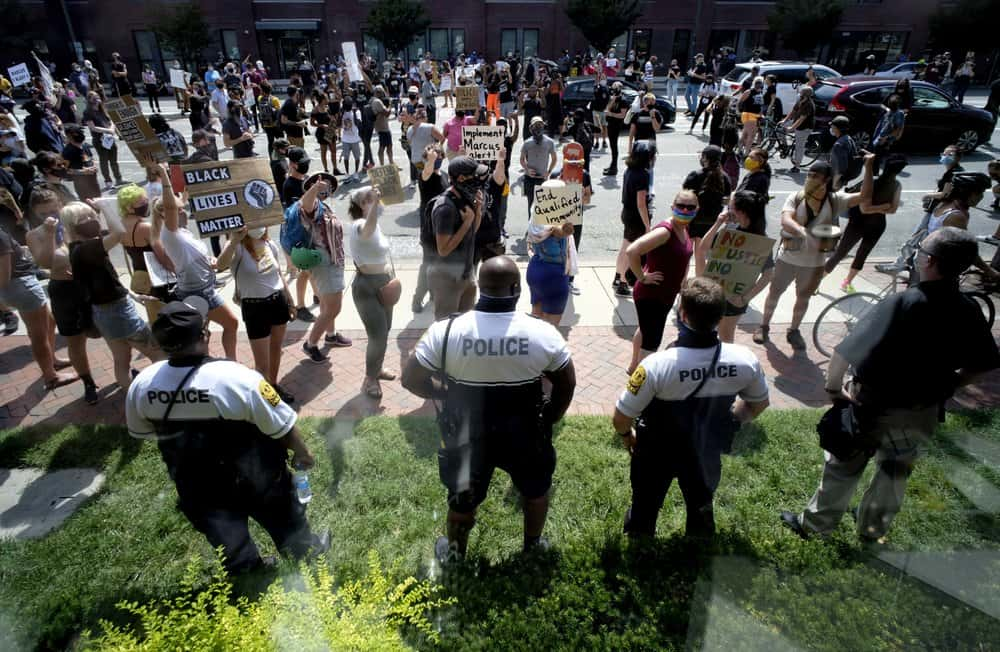
RICHMOND, Va. (AP) — A sweeping police reform bill that would eliminate the use of no-knock warrants, limit the use of chokeholds and make it easier to decertify officers for misconduct won approval from a key Virginia legislative committee Tuesday amid widespread calls for change sparked by the police killing of George Floyd in Minneapolis.
The omnibus reform bill advanced by the Senate Judiciary Committee would also require officers to intervene if they witness another officer attempting to use unlawful force and prohibit police from shooting at or into a moving vehicle unless it is necessary to protect an officer’s life or the life of someone else.
The bill was heard by the committee on the first day of a special legislative session focused on addressing both the economic impact of the coronavirus pandemic and calls for police and criminal justice reforms following Floyd’s death and months of protests around the country.
The bill won praise from both law enforcement officials and Black activists who testified remotely as members of the committee met at the Science Museum of Virginia, wearing masks and sitting at tables more than six feet apart to comply with COVID-19 social distancing requirements.
Emanuel Harris, a Black Baptist minister from Richmond, told the committee the bill is “a positive step in the right direction.” He said police officers need improved training and need to be held accountable for misconduct.
“The trust just needs to be enhanced, the accountability needs to be enhanced,” Harris said. “What we want stopped is the murder of innocent civilians, particularly African Americans that are often on the end end of stops.”
John Jones, executive director of the Virginia Sheriffs’ Association, said the group’s leadership voted overwhelmingly in favor of the bill.
The bill, sponsored by chief patron Sen. Mamie Locke, D-Hampton, would also authorize a board to create statewide standards of conduct for officers and decertify officers who violate those rules, give prosecutors access to police disciplinary records, and set up safeguards to prevent officers with records of misconduct from moving on to jobs at other police departments.
Sen. John Edwards, chairman of the committee, called the bill “a landmark piece of legislation.” It will now move on to the Senate Finance Committee.
Before getting down to business Tuesday, lawmakers haggled over logistics. House legislators, meeting at Virginia Commonwealth University’s basketball arena with desks spread far apart, argued for hours over whether to hold future meetings virtually. Democrats muscled through a change that allows lawmakers to hold meetings and votes virtually, over the strong objections of Republicans. GOP lawmakers were able to delay virtual committee meetings until next week.
The Senate, meeting at a nearby museum, grumbled about the House’s plans and said to continue meeting in person and is looking to get work on its bills done as soon as possible.
In an address to lawmakers early Tuesday, done virtually, Gov. Ralph Northam urged them to move quickly to address budget problems caused by the pandemic, pass criminal justice reform and improve voter access ahead of the presidential elections. Specifically, the governor announced a $2 million proposal for prepaid postage for all absentee ballots and budget language that expressly permits local governments to use drop boxes or implement drop-off locations for absentee voters. The Virginia Department of Elections would set security standards for the drop boxes.
“All you have to do is turn on the TV to see why this is so important,” Northam said, urging lawmakers to move quickly because the state will start mailing out absentee ballots in four weeks.
But lawmakers are still trying to figure out the new way of doing business during the pandemic. House lawmakers were given new iPads and lessons on how to use them to vote remotely.
Many male lawmakers in the House skipped wearing ties, which Northam — a pediatric neurologist — has said can help spread disease. Most lawmakers wore masks, but not all of them.
In the Senate, lawmakers were seated far apart and some with medical conditions were put behind plexiglass partitions.
Democrats, who took full control of the General Assembly earlier this year, have promised an expansive session whose proposals range from banning police chokeholds to increased spending on high-speed internet for virtual schooling.
Last week, Northam’s administration announced that it’s projecting a drop of $2.7 billion in revenues because of the pandemic. Northam officials believe the state has enough money to keep its base budget without making draconian cuts like in other states. But the Democratic governor believes the state will have to postpone spending for new initiatives or ongoing expenses like state employee and teacher pay raises or free community college for certain students.
“We feared worse. But this still requires serious and thoughtful budgeting and planning,” Northam said.
Northam wants to make one-time spending on expanding broadband internet access and boosting funds for affordable housing. He’s also seeking to extend a moratorium on evictions until next May.
Northam’s voting-security proposals come amid public backlash over mail disruptions and after President Donald Trump acknowledged that he’s starving the U.S. Postal Service of money to make it harder to process an expected surge of mail-in ballots, which he worries could cost him the election.
Democratic lawmakers have promised broad action on criminal justice reforms, including banning no-knock warrants, giving prosecutors unrestricted access to all reports and disciplinary records of police officers and downgrading the charge of assault on a police officer from a felony to a misdemeanor in cases where the officer is not injured.
Virginia is one of several states to push for such reforms after the May death of George Floyd, a Black man who died after struggling to breathe under the knee of a white Minneapolis police officer.
There were several protesters who stood outside where lawmakers gathered Tuesday. Some advocated for greater school funding and a rent relief, others — carrying assault rifles and wearing camouflage — advocated for gun rights.